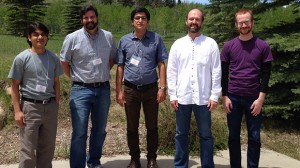OXFORD, Miss. – Five University of Mississippi faculty, staff and students gained valuable insights in cutting edge research and connected with fellow researchers at a recent international physical acoustics conference.
Josh Gladden, director of the National Center for Physical Acoustics at the university, led the 12th Physical Acoustics Summer School program. The weeklong event was co-hosted by Brigham Young University with support from the Applied Research Lab at the University of Texas and the Acoustical Society of America.
Students and highly respected lecturers from the U.S., Singapore, United Kingdom, Netherlands and Cyprus attended the seminar at Daniels Summit resort in Utah. Other UM participants included Garth Frazier, NCPA senior scientist and a first-time PASS discussion leader, and doctoral students Greg Lyons of Oxford, Vahid Naderyan of Khane Sazi, Iran, and Ukesh Koju of Bhaktapur, Nepal.
Topics included infrasound, medical acoustics, thermoacoustics, nonlinear acoustics, waves, bubbles, wave scattering and physical acoustics in solid state.
“”PASS is an excellent model for how professional summer schools should operate,” Gladden said. “Internationally recognized experts in the field lecture to and interact with leading graduate students so that they may begin their careers with both a firm knowledge of cutting edge research and a broad understanding of the field as a whole.”
The inaugural PASS school was held in Monterey, California, in cooperation with the Naval Post Graduate School and the Office of Naval Research. The program later moved to Santa Fe, New Mexico, with Los Alamos National Laboratory as a supporting institution. The 2012 program, also led by Gladden, was at Ole Miss.
“As a graduate of PASS 2000, I know firsthand how valuable this experience was for these students,” Gladden said.
Lyons said the experience was doubly beneficial to him.
“First, I was introduced to a breadth of acoustical research and methodologies that I never would have learned about otherwise,” he said. “Second, I have made connections with other students and instructors that will certainly be beneficial moving forward in my career in physical acoustics.”
Several concepts and methods presented were new to Lyons, and he hopes to use them in current and future research.
“The knowledge I have gained of nonlinear acoustics will be valuable in my current work in jet noise,” Lyons said. “I also hope to apply some of the basic concepts of noise measurement to improving my acoustic measurement methods.”
As a first-time lecturer, Frazier said PASS was a great opportunity to meet some of the best researchers in physical acoustics.
“I was very impressed with the students as well,” Frazier said. “I enjoyed talking with them about my research, and many were interested in some of the techniques I developed. The most meaningful thing was gaining insight into the broad view of physical acoustics research efforts that the students are pursuing.”
